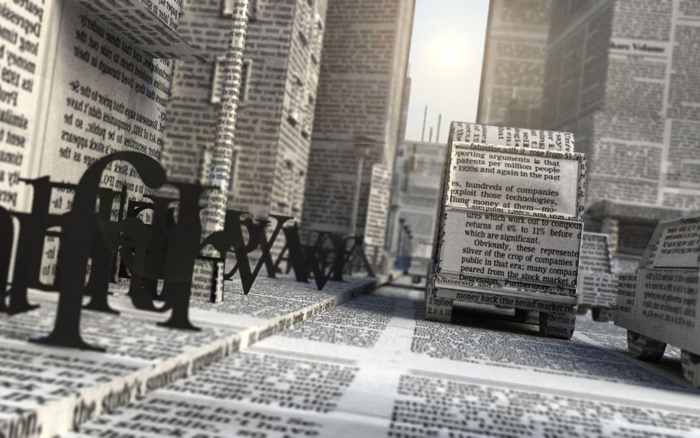The Twitter phenomenon doesn’t displace our need for accurate reporting and thoughtful writing

Newspaper world. IMAGE wallpapers-and-backgrounds.net
The world’s attention span is getting shorter, says deputy prime minister Barnaby Joyce.
“Short, sharp messages” in Facebook, Twitter and Instagram get the public’s attention these days rather than a “more involved” discussion such as a television interview, he told Emma Alberici on ABC Lateline last week.
As he sees it, the rise of these new media affects politicians and pollsters as well as journalists. “The way you think the electorate is going to vote ain’t necessarily so,” he said. “We have to take this on board and we have to react to it.”
Social networking is a true media revolution. Where once all news was communicated at regular intervals via established local or national print and broadcast channels, now it can come from anywhere at any time courtesy of your personal internet-connected device.
The advantages of being able to access information at any time and in any place are obvious. Not so obvious are the pitfalls, like a lack of professional oversight of what’s purporting to be news.
I don’t need to add the sad fact that journalists working for “reputable” media have passed off gags or scams as genuine news when a little cross-checking would have found them to be baseless. That’s what happens when professions are in a state of flux.
I have Facebook and Twitter accounts but I’ve hardly used them, which limits me as a critic of new media, but I certainly don’t condemn it out of hand. What it sometimes lacks in accuracy it makes up for in presence and immediacy. It’s not bad; it just is.
A good analogy for journalism today is the story of Kodak’s demise. The company that controlled the photographic industry for a century foresaw the threat from digital technology and led its development, but it couldn’t control the consequences.
My profession is in difficulty not because it missed seeing big changes ahead but because it didn’t know – still doesn’t know – how to keep afloat when those changes begin to happen.
That’s hardly unique to journalism. As Joyce intimates, everyone is having to manage a new reality. Politicians are just as threatened as journalists – and lawyers, for that matter – as we all try to make sense of a world where governance and the rule of law can no longer be taken for granted.
But just as we can’t take those things for granted, nor should we assume that they’re no longer wanted or relevant. It’s no accident that “law and order” is a perennial (if abused) electoral theme.
In a similar vein, journalism being in a spot of bother doesn’t mean that the written word or printed communication are falling out of favour.
It’s tempting to think that way. The advantages of recording, messaging or broadcasting speech and full-colour video to whoever we choose are obvious, such as making an impact in your job application or enhancing your dating techniques. So who needs text?
The answer is everyone, because it continues to work for us. Written language has been integral to humanity’s story since we first scratched marks on cave walls. Now, empowered by Facebook, Twitter and electronic messaging, we’re using text more than ever.
Writing does something to our language that we can’t do in ordinary, unrehearsed speech. It gives us the opportunity to contemplate what we want to say.
One result of this is the accumulated wisdom of the ages that has come to us as literature, of the kind that Richard Flanagan spoke of so reverently in a documentary about his illustrious career broadcast last week. Great writing helps define us as societies, as peoples.
Literature comes in many forms. In a recent essay in The Monthly Flanagan quoted from heavily-redacted incident reports written by staff working in Australia’s Nauru detention centre and published by the Guardian. The power of that writing is undeniable. Flanagan called it “an extraordinary trove of anonymous Australian short stories”.
What of words on paper? Visit a bookshop if you doubt the future of the printed word. We wondered if they’d survive e-books, but they did and they’re thriving.
I’ve written for newspapers for many years and read them avidly online, but I still like to browse a printed paper daily. Part of that is down to habit, but I think there’s more.
When handwriting was still the go, a mailed letter or a folded note slipped into a hand could carry huge meaning. They were touching not just in their content but also their physicality. You could feel them, literally.
Like them, newspapers provide us with news we can touch – not quite as in my youth when you could run your fingers over the letterpress imprint, but it’s still there. It still matters.
Whatever form it takes, writing will always be with us, and we will always value good writing. In Barnaby Joyce’s brave new world of “short, sharp messages” – the headline without content, where news is reduced to gossip – things could go horribly wrong.
I don’t believe we’ll allow that to happen. We need more than headlines and gossip, and we know it. Packaging changes all the time, but truthful reporting and thoughtful writing will continue to be a mainstay of public life.
